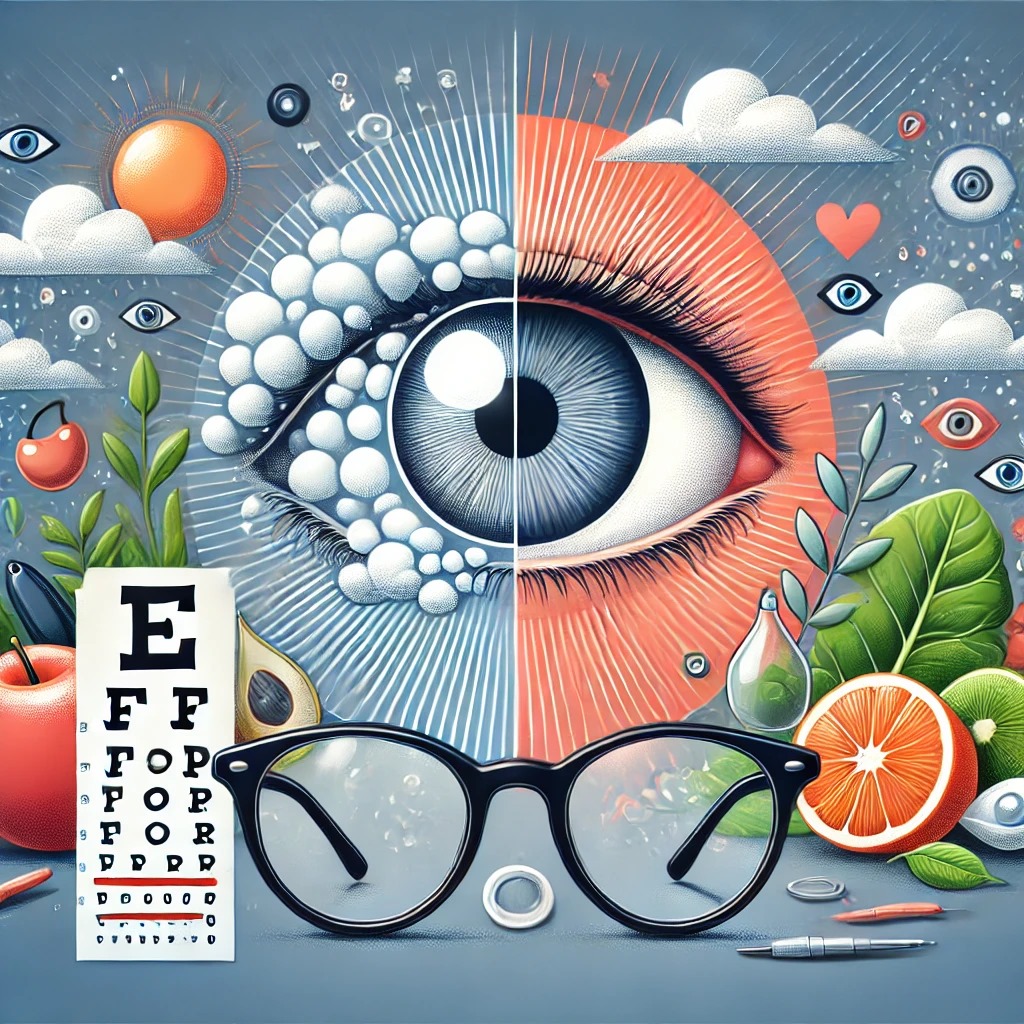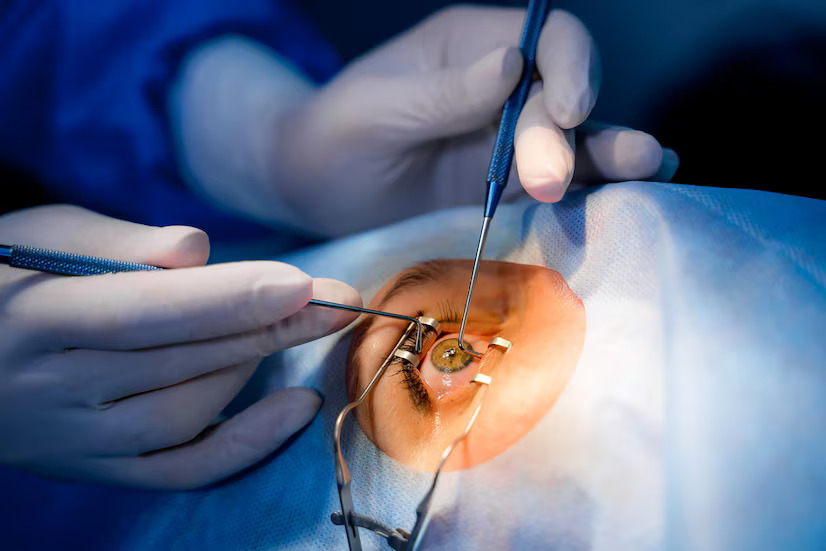If you’ve ever experienced clouded vision or noticed gradual changes in your eyesight, you might be familiar with this common eye condition. But here’s the burning question: Can cataracts be treated without surgery? Buckle up, because we’re about to explore this eye-opening topic!
What Exactly Are Cataracts?
Before we jump into treatment options, let’s understand what cataracts are all about. Picture your eye’s lens as a clear window allowing light to pass through to your retina, enabling you to see sharp images. Now, imagine that window becoming foggy or cloudy over time. That’s essentially what happens when cataracts develop. This clouding of the lens can blur your vision, making it challenging to see clearly and carry out everyday tasks.
The Power of Prevention
First things first, prevention is key! While we can’t always dodge the cataract bullet, there are steps we can take to reduce our risk. Protecting our eyes from harmful UV rays by wearing sunglasses, maintaining a healthy diet rich in antioxidants, and avoiding smoking can all play a role in keeping cataracts at bay. So, grab those shades and munch on some colourful veggies—it’s good for your eyes and your overall health!
What are the symptoms of Cataract?
-
Blurry Vision
: If your vision starts resembling a blurry Picasso painting rather than a crisp, clear image, it might be time to perk those ears up. Cataracts can cause your vision to become increasingly fuzzy or cloudy, making it challenging to see objects as sharply as before.
-
Sensitivity to Light:
The dreaded glare! If you find yourself squinting like a vampire caught in daylight or experiencing discomfort when exposed to bright lights, cataracts could be the culprit. Sensitivity to light, particularly glaring or harsh lights, is a common symptom of this pesky eye condition.
-
Difficulty Seeing at Night:
Ever feel like you’re navigating through a dark, murky abyss when the sun bids adieu? Cataracts can throw a wrench in your nighttime escapades by making it harder to see in low-light conditions. If you find yourself stumbling in the dark more often than usual, it might be time to shine a light on your eye health.
-
Faded Colors:
Remember those vibrant hues that once danced before your eyes like a kaleidoscope of joy? Well, cataracts can put a damper on your technicolor dreams by dulling the colors in your world. If everything starts looking a bit washed out or less vibrant than before, it could be a sign that cataracts are making themselves at home in your lenses.
-
Double Vision:
Seeing double might sound like a fun party trick, but trust me, it’s no picnic when cataracts crash the party. This phenomenon, known as diplopia, can occur when light gets scattered by the clouded lens, resulting in overlapping images. If you find yourself seeing two of everything, it’s time to have a chat with your eye care provider.
-
Changes in Glasses Prescription:
Ah, the old switcheroo. If you notice sudden changes in your glasses prescription, despite your eyesight being relatively stable in the past, cataracts could be the sneaky culprit. As the lens becomes cloudier, it can alter the way light enters your eye, necessitating frequent updates to your prescription.
-
Halo Effect Around Lights:
Ever feel like you’re starring in your very own celestial light show, complete with glowing halos around street lights and headlights? Cataracts can create this halo effect by scattering light as it enters the eye, resulting in those ethereal rings that seem to follow you wherever you go.
Exploring Non-Surgical Alternatives
While surgery remains the gold standard for treating cataracts, there are a few non-invasive options worth considering, especially in the early stages of the condition.
-
Lifestyle Changes:
As mentioned earlier, adopting a healthy lifestyle can go a long way in preventing cataracts from worsening. So, lace up those sneakers, load up on leafy greens, and kick those unhealthy habits to the curb!
-
Prescription Eyewear:
Sometimes, a simple pair of prescription glasses can work in improving vision affected by cataracts. Your eye care professional can help determine the right prescription to optimise your sight and keep you cruising through life with clarity.
-
Investigational Therapies:
Researchers are constantly exploring innovative therapies to tackle cataracts without resorting to surgery. From laser treatments to ultrasound technology, the future holds promise for less invasive alternatives. Keep your eyes peeled for advancements in this space!
Why Choose Cataract Surgery?
-
Improved Vision:
By removing the cloudy lens and replacing it with a clear artificial lens called an intraocular lens (IOL), this procedure can restore clarity and sharpness to your vision, allowing you to see the world in all its glory once again.
-
Enhanced Quality of Life:
Imagine a life free from the frustration of squinting at signs, struggling to read your favourite book, or feeling like you’re constantly walking through a fog. Cataract surgery can significantly enhance your quality of life by restoring your ability to carry out everyday tasks with ease and enjoyment.
-
Safety and Efficacy:
Thanks to advancements in medical technology and surgical techniques, cataract surgery has become one of the safest and most effective procedures in modern medicine. With a high success rate and minimal risk of complications, this tried-and-true treatment option offers peace of mind for those seeking clearer vision.
-
Quick and Painless:
Say goodbye to lengthy hospital stays and excruciating recovery periods—modern cataract surgery is a breeze! Most procedures are performed on an outpatient basis, meaning you can go home the same day. Plus, thanks to local anaesthesia and sedation, you’ll barely feel a thing during the surgery itself. Talk about a win-win!
-
Long-Term Results:
Unlike temporary fixes or makeshift solutions, cataract surgery offers long-term results that stand the test of time. Once the cloudy lens is removed and replaced with an IOL, you can bid farewell to cataracts for good. With proper care and regular check-ups, your newfound clarity can last a lifetime.
-
Customised Options:
No two eyes are alike, which is why cataract surgery offers a range of customised options to suit your unique needs and preferences. From choosing the type of IOL that best fits your lifestyle to selecting advanced techniques like laser-assisted surgery, you have the freedom to tailor your treatment plan to achieve optimal results.
-
Restoration of Independence:
Picture reclaiming your independence and freedom to explore the world without limitations. Whether it’s driving at night with confidence, enjoying outdoor activities with loved ones, or simply relishing the beauty of a sunset, cataract surgery can empower you to live life on your terms.
So, can cataracts be treated without surgery? While we’ve debunked and explored non-surgical options, the truth is, surgery remains the most effective treatment for advanced cataracts. However, that doesn’t mean we should overlook the importance of prevention and exploring non-invasive alternatives, especially in the early stages.
When it comes to cataract surgery, Dr Agarwals Eye Hospital stands out as a beacon of excellence and innovation. With a team of highly skilled ophthalmologists, Dr Agarwals Eye Hospital is renowned for its cutting-edge technology, personalised care, and commitment to delivering optimal outcomes for patients. From advanced surgical techniques to state-of-the-art facilities, patients can trust in the expertise and dedication of Dr Agarwals Eye Hospital to provide unparalleled quality and excellence in cataract treatment. With a patient-centric approach and a legacy of success, Dr Agarwals Eye Hospital is the go-to destination for those seeking world-class cataract surgery with a touch of compassion and care.








